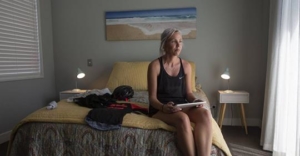26 January 2019
For years an elite cyclist’s stomach pain was put down to food intolerances. Now, Brittnea Chambers has been told her cancer is terminal.
The 32-year-old competitive cyclist is speaking out ahead of a landmark cancer care conference calling for an overhaul of cancer services in New Zealand.
For six years before this she had stomach pain and abdominal upsets misdiagnosed before a biopsy in 2017 revealed she had bowel cancer.
It had been unimaginable for doctors to consider a fit, young, athlete would have the disease, she said.
The symptoms were “explained away by other things”, including anaemia and food intolerances.
“I got to the point where I was like, ‘clearly I’m a drama queen and clearly it’s all in my head and I’m making this up’.”
Co-hosts the Cancer Society of New Zealand and Otago University say the conference, in Wellington next week, is “a crucial chance for us to take a quantum leap … about how to tackle our cancer problem”.
Cancer Society medical director Dr Chris Jackson said it was clear cancer was not a priority for the Government.
He said the Ministry of Health had just seven people overseeing all cancer services “for the 23,000 people a year who get diagnosed and treated for cancer”.
However, a ministry spokesman said there were “a number of other teams throughout the ministry” working to reduce specific cancers.
Chambers was diagnosed in Auckland with stage three bowel cancer in December 2017.
Jackson said he spoke to patients like Chambers every day who asked what could be done for them.
Often the options were limited and there had already been missed opportunities to prevent the disease from developing, he said.
After surgery and months of chemotherapy treatment Chambers said she had been cured in August last year.
Notes from her Christchurch medical team said a CT scan in Auckland on August 13, 2018 “was reported at the time of showing no evidence of metastatic disease”.
But by November another, deadly cancer had taken hold.
Another CT scan showed multiple tumours had scattered like a handful of sand throughout her abdominal cavity leading to the diagnosis of peritoneal cancer.
Chambers now regrets accepting earlier explanations for symptoms of bowel cancer.
A diagnostic colonoscopy could have picked up the bowel cancer tumours at a much earlier stage, Chambers said.
About 75 per cent of bowel cancers can be cured if caught early, according to Bowel Cancer New Zealand (BCNZ).
Even after Chambers reported symptoms of the peritoneal cancer last year she was told of a three to four week wait for an ultrasound.
Chambers is now having chemotherapy drugs pumped into her frail frame every second week to help slow the growth of the “aggressive cancer”.
BCNZ has long expressed concerns the workforce for colonoscopies was insufficient – particularly as the national bowel cancer screening programme, for the 60-74 year-old age group, increases demand.
Canterbury’s provisional start date for the programme is May 2020, depending on the readiness of the District Health Board’s colonoscopy services and completion of a new IT system, the Ministry of Health said.
An independent review of the screening programme ordered by Health Minister David Clark last year found health boards faced significant challenges but these could be “mitigated by high-quality planning and management, alongside ensuring that a ready workforce of colonoscopists is available”.
Chambers is already planning to complete two fundraising events to help raise awareness about bowel cancer; cycling 500 kilometres in eight days and taking part in Relay for Life.
She wanted people under the age of 50 to know they could still be affected by the disease, despite the majority of cases happening in older age groups.
Embarrassment about having cancer in her bowel was the last thing on her mind.
“I just don’t have time to worry about what people think about it – or me – or any of it.
“I just want to help people – and if I can normalise it a little bit more for the next person, that’s awesome.”



